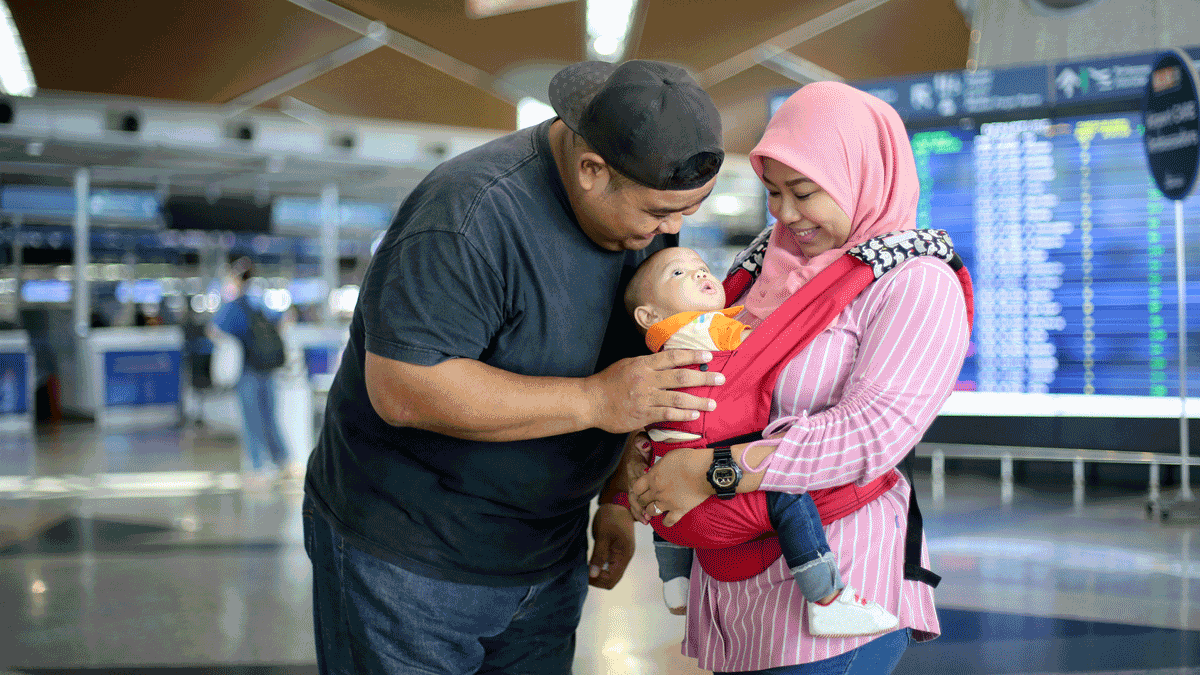Please check out our newest blog entry, “Flying with Baby.” Although it can be difficult, traveling with a newborn doesn’t have to be unpleasant. Parents can securely bring their kids on an airplane if they make the necessary preparations. Parents who wish to know everything they should know about flying with their newborn and will soon be doing so are the target audience for this article. All the information you need to make your flight as easy and enjoyable as possible is available here, along with some helpful advice!
What should you take into account when taking a baby on a flight?
You can’t wait to spend quality time during a laid-back holiday with your loved ones. Of course, one must ask themselves: What should I take into account when flying with a baby? especially before the first flight with my infant or toddler. Parents must take into account a few crucial factors to guarantee a trouble-free flight with a baby. Before anything else, parents ought to confirm that their child possesses all the paperwork required to enter the airport. Above all, this covers the necessary passports and visas for specific nations. Presenting the baby’s birth certificate may also be required in some circumstances.
Parents must provide their kids with enough food and liquids while they’re in the air. Parents should be ready and carry all the baby’s necessities, such as nursing bottles or sippy cups, appropriate toys, or musical instruments since babies have varied needs.
Furthermore, to ensure that you can sit comfortably, it’s a good idea to reserve seats in advance for your youngster. For long-haul flights in particular, if you can, select a window seat close to the restroom. This will provide you with more room and make it simpler for your infant to board and exit the aircraft.
To conclude, to prevent tension and finish all requirements on time, it is usually best to arrive at the airport early, ideally 60 to 90 minutes before departure.
At what age babies can fly?
These are questions that many parents ask themselves: When can I travel with my child? When may I take my infant on a flight? As long as they are healthy and their doctor hasn’t given them the all-clear, babies can fly as early as seven days of age. The best course of action is to have the physician complete the necessary paperwork and bring it with you on the trip. Additionally, it is a good idea to speak with the airline before departure to inquire about any limitations.
Flying with a baby for three months
What to think about when taking a baby on an airplane? A three-month-old infant can travel by air. Parents should take particular care to ensure a comfortable trip if the infant is between seven days and three months old. Before taking off, they must confirm that the baby’s physician has given the go-ahead. To rule out any health issues, doctors generally advise having a basic physical before leaving.
The airport check-in procedures must be planned as well. For this reason, it’s wise to arrive at the airport early and make sure you have all the required paperwork available, especially if you’re going to some nations. Along with packing all the essentials, including toys or musical instruments, it’s a good idea to reserve cozy seats for the infant.
Is it possible to fly with a 4-month-old baby?
You can take a 4-month-old infant on a plane, yes. Parents should speak with the baby’s physician for a medical assessment and the necessary approval for flying travel if the child is younger than seven days old.
Flying with an 8-month-old baby
Taking an 8-month-old baby on a flight is feasible. Even so, medical professionals advise parents to have all the paperwork available and to see the baby’s physician before leaving.
When to fly with a baby for the first time?
Before taking their child on a flight for the first time, parents should get their child’s health checked out and obtain authorization from the pediatrician. Travel is allowed as early as seven days old, provided the medical examination is positive. It’s best to reserve cozy seats close to the restroom for lengthy flights so the infant has more room.
It is imperative to meticulously arrange the airport check-in procedures and ensure that the required documentation is readily available. Bring along any tools the kid might require as well, such as toys or music players, for example.
What documentation is required when traveling with a baby?
Identity documents: Does a baby already need a passport?
A formal document verifying maternity and the baby’s passport photo are typically required for parents to travel with a child. A copy of the birth certificate may also be required in some circumstances. Most countries also need the youngster to have a valid visa or travel permission. Before departure, it is highly advised to ascertain the requirements for all required paperwork. Among these are:
- Passport photo of the baby
- Official documents confirming maternity
- Copy of birth certificate (if required)
- Visa or travel permit
What paperwork is required for babies to go by air?
When traveling by flight, children typically require a passport photo and an official certificate certifying their pregnancy. In certain situations, a copy of the birth certificate could also be necessary. The children may additionally require a visa or travel permission, depending on the location. For this reason, it is best to confirm that you have all the required paperwork before leaving.
Exemptions for infants younger than seven days
During the initial weeks following childbirth, mothers rarely consider taking flights. But as time goes on, you’ll desire to take a vacation once more. There are a few things, nevertheless, that you should think about. Make sure you have all the required paperwork before you board a plane with a newborn under seven days old. Regarding flights, there might be unique specifications and limitations. Thus, you ought to speak with the airline in advance of the trip to go over your particular situation. The airline may also ask for written proof from the doctor or physician if the baby is less than 72 hours old (three days).
- Medical grounds dictate that the baby must be transported in an incubator. For instance, this might apply to preterm births.
- Due to an acute, serious illness or an unplanned bereavement, the mother or parents must go.
For how long can babies travel free of charge?
Infants under two years old can travel on a parent’s lap for free. Usually, there is a discounted price if the infant uses the seat. However, it frequently happens that children travel free of charge up until the age of two, after which they must either board as lap children or as paying customers, depending on the airline.
Do babies feel pain when flying?
Flying normally causes little pain to babies. But occasionally, a newborn may feel uncomfortable due to the pressure differential experienced during takeoff and landing. For this reason, it’s best to nurse your kid during the flight or provide a bottle to help with ear grinding. Additionally helpful are several medications and nasal sprays. Nonetheless, before leaving with the infant, issues ought to be addressed with the pediatrician.
What should you do if a baby cries on the plane?
There are a few strategies you might try to use if the infant cries during the flight. Maintaining composure when holding the infant in your arms or gently rocking him is crucial. Providing the infant with toys or a mobile toy before the takeoff of the aircraft is another way to avoid this issue. Before boarding, be sure to cover your baby up warmly as well, even in the summer, as they are susceptible to cold. If everything else fails, using earplugs to block the baby’s ears from the noise on the aircraft may be useful.
Is flying risky for a baby?
No, flying is often a safe way for infants to travel. When traveling with a newborn, there are a few things to keep in mind. It’s crucial to know what is permitted on your specific journey because airline policies differ. Additionally, infants may cry or experience oxygen deprivation when flying due to pressure. Additionally, the volume of noise and vibration throughout the trip may cause discomfort for infants. Giving your infant a bottle or pacifier during takeoff and landing will help him adjust to the changes in air pressure. Therefore, to assess potential risks, it is always advisable to see your doctor beforehand.
How should I travel with a baby on an airplane?
To make a flight as safe and comfortable as possible for your infant, there are a few things you should think about. You must first familiarize yourself with the policies of your airline, the national flight restrictions of the nation where you are landing, and the required paperwork. To ensure that your infant gets the perfect seat, it’s also a good idea to make reservations in advance. To provide the child and other passengers with a more comfortable journey, it can also be beneficial to arm yourself with specific gear. But it’s best to modify and arrange the trip to suit your infant’s demands. A flight can be pretty peaceful if you prepare properly.

